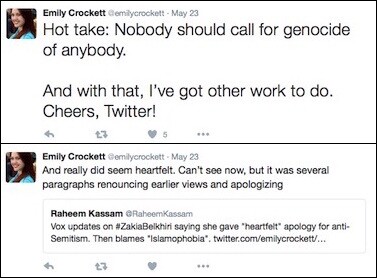Originally published under the title “Vox: Muslim Selfie Girl’s Apology Was ‘Heartfelt’... Islamophobes Capitalised.”
Vox.com doubled down on its celebration of Zakia Belkhiri even after her anti-Semitic comments came to light. |
Vox.com has sought to reverse the overt Jew hatred of “Muslim selfie star” Zakia Belkhiri, blaming “Islamophobes” for using her comments as an “opportunity” instead.
Ms. Belkhiri, who shot to internet fame for taking pictures of herself outside a Flemish nationalist protest, was offered gleaming coverage by the likes of Vox.com, which announced: “She decided to take some cheerfully defiant selfies in front of the protesters.”
Following the Breitbart London story about her anti-Semitism, the Vox.com article was updated, but not in the way you might assume.
Instead of asking tough questions of Ms. Belkhiri, and posting her anti-Semitic comments for all to see, Vox journalist Emily Crockett used the situation as an opportunity to attack anonymous, “Islamophobic” Twitter accounts.
Citing Breitbart London, Crockett’s update said:
But of course, with virality [sic] comes increased scrutiny. Within days, screenshots of an offensive tweet Belkhiri apparently sent in 2012 (reading “Hitler didn’t kill all the jews, he left some. So we [would] know why he was killing them”) began circulating, and getting coverage particularly from right-wing and anti-Muslim media sources.
Belkhiri, who had already been tweeting about wanting to be left alone by the media before her tweet resurfaced, briefly deactivated her Twitter account. Then she reactivated it to tweet a lengthy, heartfelt apology to the Jewish community in both Dutch and English, before deactivating her account again.
Her apology probably wouldn’t be enough for everyone. Still, some used the incident as an opportunity to spout even more of the Islamophobic hatred that Belkhiri was protesting in the first place.
The BBC dejectedly wrote that the story of the selfie star had “a not so pleasant postscript.”
Crockett defended her praise of Belkhiri on Twitter. |
Ms. Belkhiri returned to Twitter to suggest her comments were about Zionists, not Jews – even though her initial comments decried the “Jew language” Hebrew, and she made reference to the Holocaust – something that was perpetrated on Jews, not Zionists.
But this isn’t something Vox seemed to be concerned about. Nor were her initial claims that the anti-Semitic quotes were “Photoshopped” – an excuse that was revealed to be a lie when she finally took responsibility and “apologised.”
Crockett, to her credit, was at least engaging with critics on Twitter, offering this “hot take": “Nobody should call for genocide of anybody.” But she also was very forgiving of Ms. Belkhiri, saying her apology “really did seem heartfelt.”
And of course, when asked if she’d do the same with anti-Semitic tweets, which predominantly emerge from one constituency (at least where I’m from), she had to bring up Donald Trump, saying “With Trump running for president it’ll probably be sooner rather than later.”
Raheem Kassam is a Shillman-Ginsburg fellow at the Middle East Forum and editor-in-chief of Breitbart London.





